Fleurs du Mal Magazine


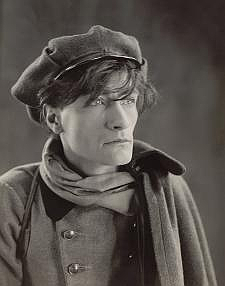
Poème Révolte contre la poésie
Nous n’avons jamais écrit qu’avec la mise en incarnation de l’âme,
mais elle était déjà faite, et pas par nous-mêmes,
quand nous sommes entrés dans la poésie.
Le poète qui écrit s’adresse au Verbe et le Verbe a ses lois.
Il est dans l’inconscient du poète de croire automatiquement à ces lois.
Il se croit libre et il ne l’est pas.
Antonin Artaud
(1896 – 1948)
Poème Révolte contre la poésie
• fleursdumal.nl magazine
More in: Antonin Artaud, Archive A-B, Archive A-B, Artaud, Antonin

She Walks in Beauty
She walks in beauty, like the night
Of cloudless climes and starry skies;
And all that’s best of dark and bright
Meet in her aspect and her eyes:
Thus mellow’d to that tender light
Which heaven to gaudy day denies.
One shade the more, one ray the less,
Had half impair’d the nameless grace
Which waves in every raven tress,
Or softly lightens o’er her face;
Where thoughts serenely sweet express
How pure, how dear their dwelling-place.
And on that cheek, and o’er that brow,
So soft, so calm, yet eloquent,
The smiles that win, the tints that glow,
But tell of days in goodness spent,
A mind at peace with all below,
A heart whose love is innocent.
Lord Byron
(1788 – 1824)
She Walks in Beauty
• fleursdumal.nl magazine
More in: Archive A-B, Archive A-B, Byron, Lord
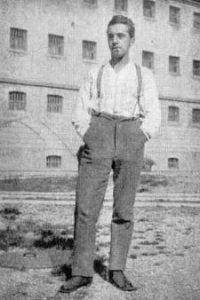
Nacht
Zinnoberroter Traum emporreißt unterdrückte Lust,
Die wandgeketteten verdammten Pritschen stöhnen,
O, nun auftauchen Bilder, die den kahlen Raum verschönen,
Der Dämon wühlt in unsrer Brust.
Erwachend höhnen, Kupplerinnen, uns die Eisengitter,
Im Morgengrauen sind die Zellen wie verweinte Mütter.
Ernst Toller
(1893 – 1939)
Nacht
• fleursdumal.nl magazine
More in: Archive S-T, Archive S-T, Toller, Ernst
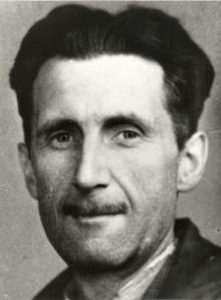
Our Minds Are Married,
But We are Too Young
Our minds are married, but we are too young
For wedlock by the customs of this age
When parent homes pen each in separate cage
And only supper-earning songs are sung.
Times past, when medieval woods were green,
Babes were betrothed, and that betrothal brief.
Remember Romeo in love and grief—
Those star-crossed lovers—Juliet was fourteen.
Times past, the caveman by his new-found fire
Rested beside his mate in woodsmoke’s scent.
By our own fireside we shall rest content
Fifty years hence keep troth with hearts desire.
We shall remember, when our hair is white,
These clouded days revealed in radiant light.
George Orwell
(1903 – 1950)
Our Minds Are Married, But We are Too Young
• fleursdumal.nl magazine
More in: Archive O-P, Archive O-P, George Orwell, Orwell, George, Romeo & Juliet
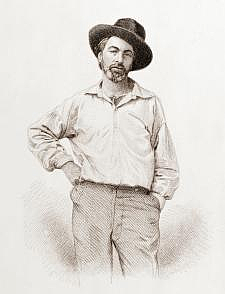
Among the Multitude
Among the men and women the multitude,
I perceive one picking me out by secret and divine signs,
Acknowledging none else, not parent, wife, husband, brother, child,
any nearer than I am,
Some are baffled, but that one is not–that one knows me.
Ah lover and perfect equal,
I meant that you should discover me so by faint indirections,
And I when I meet you mean to discover you by the like in you.
Walt Whitman
(1819 – 1892)
Poem: Among the Multitude
• fleursdumal.nl magazine
More in: Archive W-X, Archive W-X, Whitman, Walt
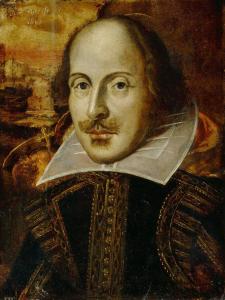
Being your slave,
what should I do but tend
Being your slave, what should I do but tend
Upon the hours and times of your desire?
I have no precious time at all to spend,
Nor services to do, till you require.
Nor dare I chide the world-without-end hour
Whilst I, my sovereign, watch the clock for you.
Nor think the bitterness of absence sour
When you have bid your servant once adieu;
Nor dare I question with my jealous thought
Where you may be, or your affairs suppose,
But like a sad slave, stay and think of nought,
Save, where you are how happy you make those.
So true a fool is love that in your will
Though you do anything, he thinks no ill.
William Shakespeare
(1564 – 1616)
Being your slave, what should I do but tend
Sonnet 57
• fleursdumal.nl magazine
More in: Archive S-T, Archive S-T, Shakespeare, William

Begegnung in der Zelle
Die Dinge, die erst feindlich zu dir schauen,
Als wären sie in Späherdienst gezwängte Schergen,
Sie laden dich zu Fahrten ein gleich guten Fergen,
Und hegen dich wie schwesterliche Frauen.
Es nähern sich dir all die kargen Dinge:
Die schmale Pritsche kommt, die blauen Wasserkrüge,
Der Schemel flüstert, daß er gern dich trüge,
Die Wintermücken wiegen sich wie kleine Schmetterlinge.
Und auch das Gitterfenster kommt, das du verloren,
Mit Augen, die sich an den schwarzen Stäben stachen,
Anstarrtest, während deine Arme hilflos brachen,
Und Köpfe der Erschoßnen wuchsen aus versperrten Toren.
Das Gitterfenster ruft: Nun, Lieber, schaue, schaue,
Wie ich aus Wolken dir ein Paradies erbaue.
Ernst Toller
(1893 – 1939)
Begegnung in der Zelle
• fleursdumal.nl magazine
More in: Archive S-T, Archive S-T, Toller, Ernst

La rue
La rue sexuelle s’anime
le long de faces mal venues,
les cafés pepiant de crimes
deracinent les avenues.
Des mains de sexe brûlent les poches
et les ventres bouent par-dessous;
toutes les pensees s’entrechoquent,
et les tetes moins que les trous.
Antonin Artaud
(1896 – 1948)
La rue
• fleursdumal.nl magazine
More in: Antonin Artaud, Archive A-B, Archive A-B, Artaud, Antonin, Psychiatric hospitals

Guerre
Rameau central de combat
Contact par l’écoute
On tire dans la direction ‘ des bruits entendus ‘
Les jeunes de la classe 1915
Et ces fils de fer électrisés
Ne pleurez donc pas sur les horreurs de la guerre
Avant elle nous n’avions que la surface
De la terre et des mers
Après elle nous aurons les abîmes
Le sous-sol et l’espace aviatique
Maîtres du timon
Après après
Nous prendrons toutes les joies
Des vainqueurs qui se délassent
Femmes Jeux Usines Commerce
Industrie Agriculture Métal
Feu Cristal Vitesse
Voix Regard Tact à part
Et ensemble dans le tact venu de loin
De plus loin encore
De l’Au-delà de cette terre
Guillaume Apollinaire
(1880 – 1918)
Guerre
• fleursdumal.nl magazine
More in: *Concrete + Visual Poetry A-E, Apollinaire, Guillaume, Archive A-B, Archive A-B, Guillaume Apollinaire
Ton van Reen schreef onder meer romans, kinder- en jeugdboeken en journalistiek werk.
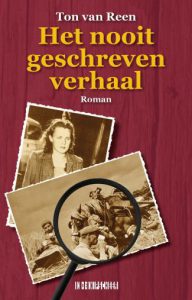 Bekend zijn de romans Het winterjaar, Roomse meisjes en Concert voor de Führer. Gestolen jeugd is het ware verhaal van jongens en mannen die aan het eind van de Tweede Wereldoorlog als dwangarbeiders naar Duitsland werden gevoerd. De lichtverkoper werpt licht op een donker tijdperk in de geschiedenis van de kinderarbeid in de negentiende eeuw. De verdwenen stad is de werdegang van een advocaat. Dochters is het levensverhaal van een journalist in Afrika. Katapult is een verhaal over gewone mensen in roerig Amsterdam in de vorige eeuw. De bende van de bokkenrijders werd verfilmd tot een veelbekroonde tv-serie. In Frankrijk spelen zijn boeken Vlucht uit Montaillou, Bevroren dromen, Landverbeuren en In het spoor van de camisards.
Bekend zijn de romans Het winterjaar, Roomse meisjes en Concert voor de Führer. Gestolen jeugd is het ware verhaal van jongens en mannen die aan het eind van de Tweede Wereldoorlog als dwangarbeiders naar Duitsland werden gevoerd. De lichtverkoper werpt licht op een donker tijdperk in de geschiedenis van de kinderarbeid in de negentiende eeuw. De verdwenen stad is de werdegang van een advocaat. Dochters is het levensverhaal van een journalist in Afrika. Katapult is een verhaal over gewone mensen in roerig Amsterdam in de vorige eeuw. De bende van de bokkenrijders werd verfilmd tot een veelbekroonde tv-serie. In Frankrijk spelen zijn boeken Vlucht uit Montaillou, Bevroren dromen, Landverbeuren en In het spoor van de camisards.
Ton van Reen over het ontstaan van zijn nieuwe roman:
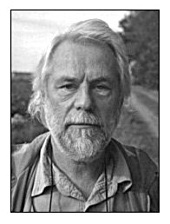 “Zestig jaar geleden werkte ik als leerling-verpleger in Psychiatrisch Ziekenhuis Ursula in Wassenaar. Drie avonden in de week bezocht ik de avond-HBS in Den Haag. Bij thuiskomst kwam ik vaak, op eigen verzoek, in de nachtdienst terecht.
“Zestig jaar geleden werkte ik als leerling-verpleger in Psychiatrisch Ziekenhuis Ursula in Wassenaar. Drie avonden in de week bezocht ik de avond-HBS in Den Haag. Bij thuiskomst kwam ik vaak, op eigen verzoek, in de nachtdienst terecht.
Vaak had ik lange gesprekken met patiënten die slecht sliepen. Er was een man die mij het verhaal vertelde over een misdaad die hij niet had begaan maar waarvoor hij de schuld op zich had genomen. Uit liefde. Daarna belandde hij lange jaren in de gevangenis.
Zijn verhaal bleef mijn leven lang in mijn hoofd hangen. Ik wilde het ooit opschrijven. Het kwam er nooit van.
Het drama had zich afgespeeld in een kloosterdorp, in Brabant of Limburg, zoals Velp bij Grave, of Steijl bij Tegelen. Tot ik opeens besefte dat er ook zo’n dorp met een psychiatrische inrichting bij mij in de buurt lag. Koningslust, een kerkdorp van de gemeente Helden waar zich een deel van mijn jeugd had afgespeeld. Een dorp dat mede ontstaan was door het klooster dat er in 1849 was gesticht door de Broeders van Sint Joseph.
Alles viel op zijn plek. Ik had een handvat om het verhaal waarvan ik alleen de kern kende, op te schrijven. Het verhaal had ik zestig jaar geleden gehoord en het speelde zestig jaar eerder, rond 1900. Ik besloot het in deze tijd te plaatsen. Het is immers een verhaal van alle tijden. De kern, over de man die zich opoffert uit liefde, blijft.”
Ton van Reen
Het nooit geschreven verhaal
Roman
Vormgeving omslag Carmen Arends
Gebrocheerd in omslag
240 blz.
Uitgeverij In de Knipscheer
ISBN 978-94-93214-68-2
Eerste uitgave maart 2022
€ 19,50
• fleursdumal.nl magazine
More in: - Book News, - Bookstores, Archive Q-R, Archive Q-R, Psychiatric hospitals, Reen, Ton van, Reen, Ton van, Ton van Reen

Sweetest Love, I do Not Go
Sweetest love, I do not go,
For weariness of thee,
Nor in hope the world can show
A fitter love for me;
But since that I
At the last must part, ’tis best,
Thus to use myself in jest
By feigned deaths to die.
Yesternight the sun went hence,
And yet is here to-day;
He hath no desire nor sense,
Nor half so short a way;
Then fear not me,
But believe that I shall make
Speedier journeys, since I take
More wings and spurs than he.
O how feeble is man’s power,
That if good fortune fall,
Cannot add another hour,
Nor a lost hour recall;
But come bad chance,
And we join to it our strength,
And we teach it art and length,
Itself o’er us to advance.
When thou sigh’st, thou sigh’st not wind,
But sigh’st my soul away;
When thou weep’st, unkindly kind,
My life’s blood doth decay.
It cannot be
That thou lovest me as thou say’st,
If in thine my life thou waste,
That art the best of me.
Let not thy divining heart
Forethink me any ill;
Destiny may take thy part,
And may thy fears fulfil.
But think that we
Are but turn’d aside to sleep.
They who one another keep
Alive, ne’er parted be.
John Donne
(1572 – 1631)
Sweetest Love, I do Not Go
• fleursdumal.nl magazine
More in: Archive C-D, Archive C-D, Donne, John

Maxime Garcia Diaz, Ferdy Karto,
Nisrine Mbarki & Esohe Weyden
Genomineerd voor de 35ste C. Buddingh’-prijs (2022)
De jury van de C. Buddingh’-prijs 2022 nomineert de poëziedebuten van Maxime Garcia Diaz, Ferdy Karto, Nisrine Mbarki en Esohe Weyden voor de 35ste editie van de C. Buddingh’-prijs, Poetry Internationals jaarlijkse prijs voor het beste Nederlandstalige poëziedebuut. De juryleden Daan Doesborgh, Jelle Van Riet en Michael Tedja selecteerden deze vier kanshebbers uit de rijke oogst van 26 ingezonden debuutbundels.
De winnaar van de C. Buddingh’-prijs 2022 wordt op zondag 12 juni a.s. bekend gemaakt tijdens De STAAT van de POËZIE op het 52ste Poetry International Festival Rotterdam. Poetry International presenteert op weg naar de uitreiking verschillende evenementen rondom de genomineerde bundels en dichters, zoals de C. Buddingh’-Online Leesclub met Ingmar Heytze.
De jury van de C. Buddingh’-prijs 2022 nomineert de poëziedebuten van Maxime Garcia Diaz, Ferdy Karto, Nisrine Mbarki en Esohe Weyden voor de 35ste editie van de C. Buddingh’-prijs, Poetry Internationals jaarlijkse prijs voor het beste Nederlandstalige poëziedebuut.
De juryleden Daan Doesborgh, Jelle Van Riet en Michael Tedja selecteerden deze vier kanshebbers uit de rijke oogst van 26 ingezonden debuutbundels.
De winnaar van de C. Buddingh’-prijs 2022 wordt op zondag 12 juni a.s. bekend gemaakt tijdens De STAAT van de POËZIE op het 52ste Poetry International Festival Rotterdam. Poetry International presenteert op weg naar de uitreiking verschillende evenementen rondom de genomineerde bundels en dichters, zoals de C. Buddingh’-Online Leesclub met Ingmar Heytze.
Meer over de C. Buddingh’prijs:
https://www.poetryinternational.com/nl/c-buddingh/c-buddingh-prijs
• fleursdumal.nl magazine
More in: AUDIO, CINEMA, RADIO & TV, Buddingh', Cees, Literary Events, Poetry International, STREET POETRY
Thank you for reading Fleurs du Mal - magazine for art & literature